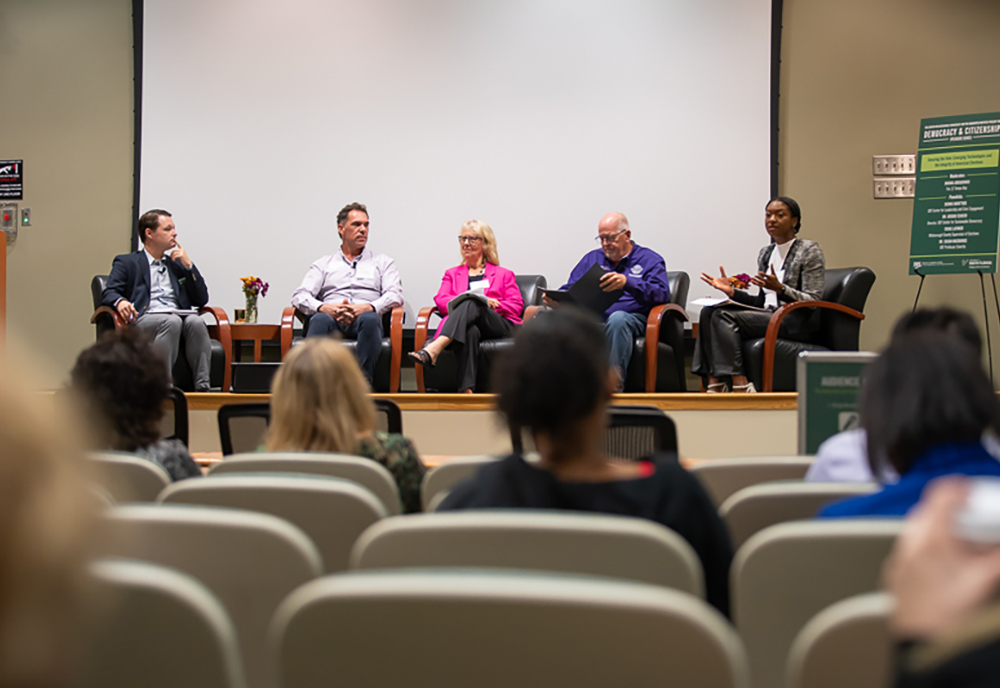The USF College of Arts and Sciences’ Democracy and Citizenship Speakers Series aims to help navigate our role as citizens in a democratic society.
Its most recent discussion, co-sponsored by the Center for Sustainable Democracy and the League of Women Voters of Hillsborough and Pasco counties, focused on the challenges and opportunities of voting in today’s digital landscape and how misinformation and disinformation spread through social media and artificial intelligence technologies.
Local journalist Briona Arradondo moderated the discussion among panelists including Hillsborough County Supervisor of Elections Craig Latimer, USF Professor Emerita Dr. Susan MacManus, USF’s Center for Leadership and Civic Engagement Dennis Mont’Ros, and the Center for Sustainable Democracy Director Dr. Joshua Scacco.
The discussion, “Securing the Vote: Emerging Technologies and the Integrity of American Elections” was held on Sept. 19 at C.W. Bill Young Hall.
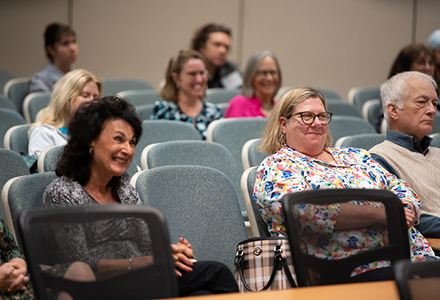
Members of the audience engaged with the discussion. (Photo by Corey Lepak)
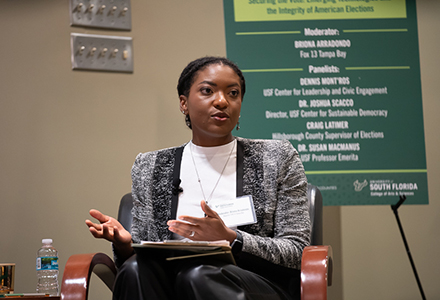
Local journalist and the moderator for the evening’s discussion, Briona Arradondo (Photo by Corey Lepak)
During her opening remarks, Arradondo addressed the overarching theme regarding this year’s election cycle: misinformation and disinformation.
“Misinformation is sharing untrue information without the intent of harm. So, for example, your friend tells you that you can mail in your vote-by-mail ballot on Election Day and later you learn on Google that it didn’t count because if it’s postmarked the day after [Election Day] your vote doesn’t count,” she explained.
“Disinformation is the intentional sharing of false information to create chaos. So, for example, you may get a text message from an unknown number reporting that there’s been a bomb threat, and the polls are closed. That was to create chaos, and it’s obviously not true,” she added.
This raised a central question covered during the discussion: How does the rise of social media — a major driver of misinformation and disinformation — create problems for the election process?
The panelists agree that social media can create problems for the election process; however, they agreed that it is not at the fault of social media users for sharing misinformation online. “Regarding social media, I find it interesting that, based on my conversations with students both in my democratic engagement role and my faculty role, students aren’t as into social media. Instead, they’re looking at the comment sections on social media, or any website. They’re looking to get more information from their peers,” explained Mont’Ros.
This realization led to a major overarching idea: how to be a trusted source of information when our digital landscape can be used to spread misleading information.
“One of the things that I oftentimes think about is – people are looking to us and we might not realize it. Someone in your life might be looking to you as a trusted source. And so being able to direct them to the places where they can see, for instance, how this is disinformation – that can be really important and impactful,” Scacco emphasized.
“One of the things that I oftentimes think about is – people are looking to us and we might not realize it. Someone in your life might be looking to you as a trusted source. And so being able to direct them to the places where they can see, for instance, how this is disinformation – that can be really important and impactful,” Scacco emphasized.
With historically low faith in U.S. institutions, including the government and broadcast news stations according to a 2023 Gallup poll, the panelists were all in agreement about the major challenges of making a democracy work.
“Who do people trust the most for information?” MacManus asked.
“Hands down family and friends are the biggest source of trust in our system right now,” she said.
This means, the panelists agreed, it is imperative – now more than ever – that voters be informed about who and what they are voting for on November 5.
“Be ambassadors,” Latimer advised.
“We’ve talked a lot about trusted sources and trusted messengers tonight – utilize that. Take that back and expand on that yourself. There are plenty of avenues you can use to verify information or to see if information is truthful or not,” he said.
“I would say technology is forcing all of us to be more informed, know that we don’t know everything that we think we do, and to be critical consumers,” MacManus explained. “As you look at a label on a food item, you take that at face value. But in this arena, you can’t necessarily take things at face value. And we do have an individual responsibility for trying to inform ourselves that.”
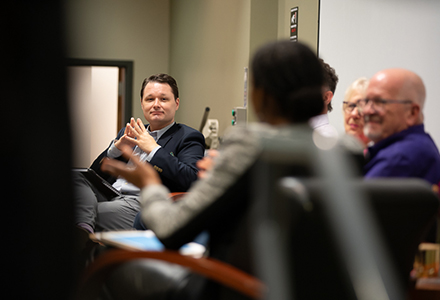
Dr. Josh Scacco, director of the Center for Sustainable Democracy (Photo by Corey Lepak)
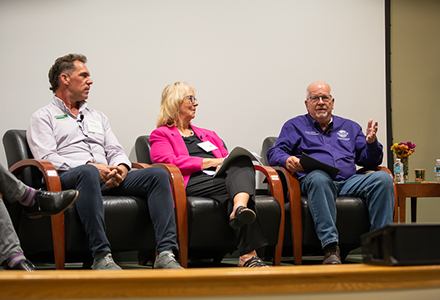
(From left) Panelists Dennis Mont’Ros (Student Programs Coordinator, Center for Leadership and Civic Engagement), Dr. Susan MacManus (USF Professor Emerita), and Craig Latimer (Hillsborough County Supervisor of Elections). (Photo by Corey Lepak)
Mont’Ros agreed: “It is truly our personal responsibility to seek the truth, and no one is going to help us unless we are willing to help ourselves first. We must take responsibility for fact-checking, ensuring that any information we share is accurate, and being mindful of how susceptible the people we’re sharing it with might be to misinformation.”
“I think all of us somewhere are looking for a magic bullet. What is going to fix this? And really, the key thing I always go back to is we are the ones we’ve been waiting for. There isn’t going to be a white knight on this matter. No platform is going to fix it. No government is going to fix it. No entity is going to fix it. No billionaire is going to come in and fix it. So, we have to equip ourselves with the skills to make the decisions because someone else out there is either doing it or not doing it. And guess what? Their vote counts just as much as yours,” Scacco concluded.
“And that’s what gets me up every day, is realizing that we’re the ones who can decide and change and make the change on these particular things.”
Learn more about attending future Democracy and Citizenship Speaker Series lectures.
Additional resources to prepare for Election Day
-
